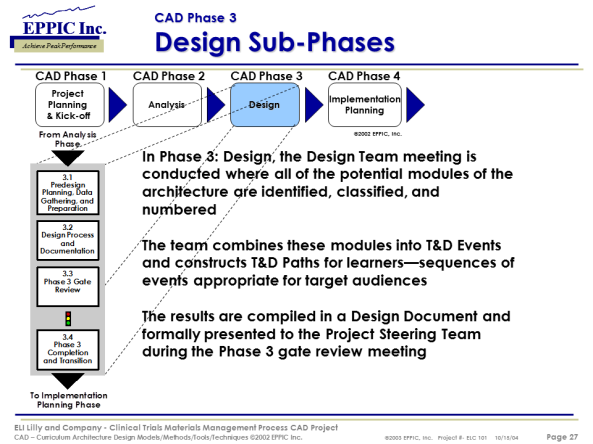CAD Bottom Lines
A CAD effort produces Learning Paths – or Performance Competence Development Paths.
Here are two Learning Paths – or Leadership & Management Development Paths – one for Supervisors and one for their Managers.
The 4 key output/reports for their project are presented below.
Paid for by US Taxpayers. Thank them.
The Supervisor Path
The Manager’s Path
Each Path had Performance Competence Tests (not Knowledge Tests) at critical points in each “Phase” of the Path – and then unique and shared Content – formal classes and structured peer/expert coaching and … structured Experiences (interview peers, bosses, stakeholders, etc.) dealing with people and systems and everything needed.
One critical example of what was addressed very early in the Supervisor Path was dealing with Pay issues. THAT was in this situation – both authentic and extremely critical as a Survival Skill.
Critical Business Issue
Why did the Shipyard attempt to Formalize what had been mostly Informal for decades?
Within a few years the average years on the job for shipyard mangers was going to take a huge drop due to upcoming retirements. All at once … due to the spikes in hiring decades earlier.
This had implications for errors and quality issues, and at a US Navy shipyard – at a time of war – THAT was simply unacceptable and something to address.
Continuing to develop managers informally, as was the past practice, was now worrisome practice and something shipyard leadership had recently targeted this for a major response to avoid Murphy. If you know what I mean.
Response
I was brought in to conduct a CAD effort. Others would follow up post-CAD to develop the gap content and update the existing content that was repairable. In less than 90 days during the last few months of 2003 we had completed the 4 Phases of my CAD efforts.
I’ve been doing these since 1982.
CAD efforts figure out what you need and what you have and what the priorities for addressing gaps or currency or adequacy issues with existing content.
CAD Next Level of Detail Re the 4 Phases
Those key outputs are what’s presented below – by Phase.
But first – a Roadmap for what’s included…
Key CAD Outputs
Phase 1- Project Planning & Kick-Off
This Phase is simple so critical to the entire effort that it should be addressed seriously and thoroughly – or the effort should be dropped at the first GRM – Gate Review Meeting – IMO.
Here is an example CAD Project Plan:
cad-p1-project-plan-example-2003-09-15
Note: this is a 34 page PDF document.
Phase 2- Analysis
Analysis of the Performance Requirements first and then of all existing content leads to appropriate ReUse later.
Here is an example CAD Analysis Report:
cad-p2-analysis-report-example-2003-10-15
Note: this is a 547 page PDF document.
Phase 3- Design
This is where GIGO – good in/ good out — or — garbage in/ garbage out plays out. In the design of the Path or Paths.
It all depends on the Analysis data being used and the people in the process.
My 7-Step Design Meeting process:
Here is an example CAD Design Document:
cad-p3-design-document-example-2003-11-11
Note: this is a 479 page PDF document.
Phase 4- Implementation Planning
Not all Content that could be – should be.
Here is where “what should remain totally Informal” is decided – as a Business Decision – not an Instructional Design Decision.
Here is an example CAD Implementation Plan:
cad-p4-implementation-plan-example-2003-12-02
Note: this is a 140 page PDF document.
The CAD effort led then to the MCD (ADDIE-like) efforts. Another group took on that effort for my client.
Additional Resources
Check the Resource tab for both FREE and FOR a FEE resources.
There are over 400 free resources available on this site.
The Group Process Is Key – IMO

Check out the articles from 1984…

CAD – Training Mag – 1984 – 6 page PDF – the first publication about Curriculum Architecture Design via a Group Process – published in Training Magazine in September 1984. Original manuscript (30 pages) – How to Build a Training Structure That Won’t Keep Burning Down.
Models and Matrices- NSPI PIJ -1984 – 5 page PDF – the first publication of the performance and enabler analysis methods for ISD, from NSPI’s (ISPI’s) Performance & Instruction Journal, November 1984.
Also see my 1999 book: lean-ISD…
lean-ISD (1999)
Click on image to link to the download page.
Note: the cover design for “lean-ISD” was created by the late Geary A. Rummler.
Note: Guy W. Wallace’s book “lean-ISD” – was a recipient of a 2002 Award of Excellence for Instructional Communication from the International Society for Performance Improvement.
lean-ISD is also available as a $15 paperback book – and $7.50 as a Kindle – for more and to order – please go – here.
And the updated books from 2011…

For more info on these 6 books please go – here.
# # #














Pingback: Performance Based Instructional Analysis Examples for Sales from 1986 and 1993 | EPPIC Annex – Pursuing Performance
Pingback: Resources for Curriculum Architecture Design – The Pursuing Performance Annex
Pingback: Examples from Performance-Based ISD Efforts | EPPIC - Pursuing Performance
Pingback: L&D: Example Analysis Reports & Design Documents From 1980-1990 | EPPIC - Pursuing Performance
Pingback: L&D: Sales Rep and Sales Management Analysis Data Examples From 1993 | EPPIC - Pursuing Performance